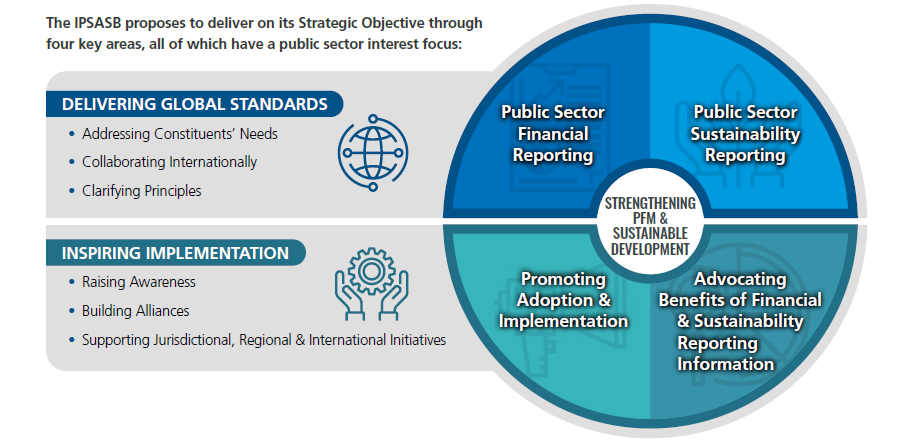IPSASB Consults on 2024-2028 Strategy and Work Program
The International Public Sector Accounting Standards Board® (IPSASB®), developer of IPSAS®, international accrual-based accounting standards for use by governments and other public sector entities around the world has opened a consultation to hear stakeholder feedback on its proposed strategy and work program for the next five years.
The IPSASB’s work during 2019-2023 has addressed key gaps in the IPSAS literature which now allows for a rebalancing of its Financial Reporting Work Program towards the maintenance of IPSAS. The IPSASB proposes to put a post-implementation review process in place and to establish an Application Panel to support not only existing IPSAS users but the much larger group of stakeholders expected to be using the IPSASB Standards by 2030. The new strategy assumes that the IPSASB moves ahead with its decision to develop International Public Sector Sustainability Reporting Standards, an initiative begun in 2023 to help equip governments and other public sector entities to provide better transparency, accountability, and comparability of their efforts to combat the climate crisis and other sustainability challenges.

The proposed strategic objective of the IPSASB’s Strategy and Work Program 2024-2028 is:
- Strengthening Public Financial Management and sustainable development globally through increasing adoption and implementation of accrual IPSAS and International Public Sector Sustainability Reporting Standards.
"Having achieved so much during the 2019-2023 Strategy period, despite the major challenges we have all faced, the IPSASB has reached an inflection point,” said IPSASB Chair Ian Carruthers. “This exciting new phase of the IPSASB’s work will build on the hard work of the Board to implement the current strategy, as well as the sustained input from all our stakeholders.”
This Consultation provides an opportunity for constituents to comment on the IPSASB’s proposed Strategic Objective, and the two main activities to deliver on the Strategic Objective. In addition to the proposed new maintenance activities and the priorities for these, constituents are also asked to comment on potential future Financial Reporting Work Program priorities, and what the key public sector sustainability reporting issues are the IPSASB should consider adding to its Work Program. Stakeholders should submit responses by February 15, 2024 to ensure their views are considered.
How to Comment
To access the Consultation and its summary At-a-Glance document, or to submit a comment, visit the IPSASB website. Comments are requested by February 15, 2024. The IPSASB encourages IFAC member organizations and regional accountancy organizations to promote the availability of this Consultation to their members and employees.
About the IPSASB
The International Public Sector Accounting Standards Board (IPSASB) works to strengthen public financial management globally through developing and maintaining accrual-based International Public Sector Accounting Standards® (IPSAS®) and other high-quality financial reporting guidance for use by governments and other public sector entities. It also raises awareness of IPSAS and the benefits of accrual adoption. The Board receives support from the Asian Development Bank, the Chartered Professional Accountants of Canada, the New Zealand External Reporting Board, and the government of Canada. The structures and processes that support the operations of the IPSASB are facilitated by the International Federation of Accountants (IFAC). For copyright, trademark, and permissions information, please go to permissions or contact permissions@ifac.org.
About the Public Interest Committee
The governance and standard-setting activities of the IPSASB are overseen by the Public Interest Committee (PIC), to ensure that they follow due process and reflect the public interest. The PIC is comprised of individuals with expertise in public sector or financial reporting, and professional engagement in organizations that have an interest in promoting high-quality and internationally comparable financial information.
Submit responses by February 15, 2024
